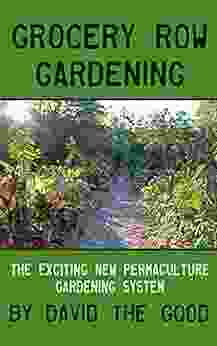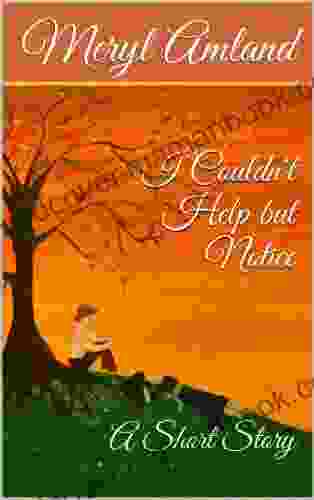Couldn't Help But Notice: A Comprehensive Exploration of the Phenomenon

In the tapestry of human experience, we are constantly bombarded with a multitude of stimuli, both internal and external. From the fluttering of a butterfly's wings to the mundane ticking of a clock, our senses are perpetually engaged in a symphony of perception. Amidst this sensory deluge, there are certain occurrences that captivate our attention, demanding our awareness and often triggering a spontaneous utterance: "I couldn't help but notice." This phenomenon, commonly referred to as noticing, is an intricate and ubiquitous aspect of our daily lives, yet its underlying mechanisms and far-reaching implications remain largely unexplored.
5 out of 5
| Language | : | English |
| File size | : | 143 KB |
| Text-to-Speech | : | Enabled |
| Screen Reader | : | Supported |
| Enhanced typesetting | : | Enabled |
| Word Wise | : | Enabled |
| Print length | : | 7 pages |
The Science of Noticing
From a neurological perspective, noticing can be attributed to the activation of specific brain regions involved in attention and salience detection. When a stimulus is presented that deviates from our expectations or captures our interest, these regions, including the anterior cingulate cortex and the insula, become engaged. This neural activity triggers a cascade of physiological responses that manifest as an involuntary shift of attention towards the noticed stimulus.
Research has also illuminated the role of dopamine, a neurotransmitter associated with reward and motivation, in the process of noticing. When we encounter something that aligns with our interests or fulfills a particular need, dopamine is released, enhancing our attention and making us more likely to notice and remember that stimulus.
The Psychology of Noticing
Beyond the neurobiological underpinnings, noticing is also heavily influenced by psychological factors. Our cognitive biases, emotional state, and personal experiences all shape what we choose to focus on and notice. For instance, we tend to notice stimuli that are congruent with our beliefs or that evoke strong emotions, either positive or negative.
Moreover, noticing can be influenced by our goals and intentions. When we are actively searching for something, whether it's a misplaced item or a potential mate, our attention becomes more finely attuned to relevant stimuli, increasing the likelihood of noticing them.
The Social Implications of Noticing
The act of noticing has profound implications for our social interactions. By paying attention to the subtle cues and behaviors of others, we gain valuable insights into their thoughts, feelings, and intentions. This ability to notice and interpret social cues is crucial for building and maintaining healthy relationships.
Noticing also plays a significant role in social norms and conventions. By conforming to certain unspoken rules of noticing, such as avoiding staring or invading personal space, we demonstrate our respect for others and maintain social harmony.
Noticing and Well-being
The capacity to notice and appreciate the present moment is closely intertwined with our overall well-being. Studies have shown that practicing mindfulness, which involves intentionally noticing and paying attention to the present moment, can reduce stress, enhance emotional regulation, and promote a sense of well-being.
Noticing can also foster gratitude and appreciation. By consciously focusing on the positive aspects of our surroundings and experiences, we cultivate a mindset that promotes happiness and contentment.
Cultivating the Art of Noticing
While noticing is an innate human capacity, it is a skill that can be honed and cultivated through practice. Here are a few strategies to enhance your ability to notice:
- Engage in mindfulness practices: Mindfulness meditation and other mindfulness-based techniques train the mind to pay attention to the present moment without judgment.
- Practice active listening: When engaged in conversations, focus on fully attending to what the other person is saying, both verbally and nonverbally.
- Explore your surroundings: Take time to notice the details and nuances of your environment, whether it be a familiar place or a new destination.
- Keep a gratitude journal: Regularly jot down things you notice and appreciate about your life, fostering a mindset of gratitude and appreciation.
The phenomenon of noticing is an integral part of the human experience, shaping our perceptions, influencing our interactions, and contributing to our overall well-being. By understanding the science, psychology, and social implications of noticing, we gain a deeper appreciation for this ubiquitous yet often overlooked aspect of our lives.
As we cultivate the art of noticing, we open ourselves up to a world of wonders that might otherwise go unnoticed. From the intricate details of nature to the subtle nuances of human interactions, there is a wealth of richness waiting to be discovered. Let's embrace the beauty of noticing and all that it has to offer.
5 out of 5
| Language | : | English |
| File size | : | 143 KB |
| Text-to-Speech | : | Enabled |
| Screen Reader | : | Supported |
| Enhanced typesetting | : | Enabled |
| Word Wise | : | Enabled |
| Print length | : | 7 pages |
Do you want to contribute by writing guest posts on this blog?
Please contact us and send us a resume of previous articles that you have written.
 Top Book
Top Book Novel
Novel Fiction
Fiction Nonfiction
Nonfiction Literature
Literature Paperback
Paperback Hardcover
Hardcover E-book
E-book Audiobook
Audiobook Bestseller
Bestseller Classic
Classic Mystery
Mystery Thriller
Thriller Romance
Romance Fantasy
Fantasy Science Fiction
Science Fiction Biography
Biography Memoir
Memoir Autobiography
Autobiography Poetry
Poetry Drama
Drama Historical Fiction
Historical Fiction Self-help
Self-help Young Adult
Young Adult Childrens Books
Childrens Books Graphic Novel
Graphic Novel Anthology
Anthology Series
Series Encyclopedia
Encyclopedia Reference
Reference Guidebook
Guidebook Textbook
Textbook Workbook
Workbook Journal
Journal Diary
Diary Manuscript
Manuscript Folio
Folio Pulp Fiction
Pulp Fiction Short Stories
Short Stories Fairy Tales
Fairy Tales Fables
Fables Mythology
Mythology Philosophy
Philosophy Religion
Religion Spirituality
Spirituality Essays
Essays Critique
Critique Commentary
Commentary Glossary
Glossary Bibliography
Bibliography Index
Index Table of Contents
Table of Contents Preface
Preface Introduction
Introduction Foreword
Foreword Afterword
Afterword Appendices
Appendices Annotations
Annotations Footnotes
Footnotes Epilogue
Epilogue Prologue
Prologue Wendy Raven Mcnair
Wendy Raven Mcnair Don Lamont
Don Lamont Brent K Whitlock
Brent K Whitlock Lee Parks
Lee Parks Carl Phelpstead
Carl Phelpstead W J Herbert
W J Herbert Harold Evensky
Harold Evensky Scott Swisher
Scott Swisher S Theresa Dietz
S Theresa Dietz Douglas W Tallamy
Douglas W Tallamy Alix Williams Ii
Alix Williams Ii Daniele Vacca
Daniele Vacca Gordon V Smith
Gordon V Smith Najib Snaike
Najib Snaike Rachel Dodman
Rachel Dodman Cedric Kelly
Cedric Kelly Shelly Sanchez Terrell
Shelly Sanchez Terrell C Scott Anderson
C Scott Anderson Joe Kenda
Joe Kenda Cameron Gordon
Cameron Gordon
Light bulbAdvertise smarter! Our strategic ad space ensures maximum exposure. Reserve your spot today!
 Julio CortázarFollow ·17.3k
Julio CortázarFollow ·17.3k Diego BlairFollow ·10.3k
Diego BlairFollow ·10.3k Felix HayesFollow ·4.7k
Felix HayesFollow ·4.7k Jon ReedFollow ·4.4k
Jon ReedFollow ·4.4k Reginald CoxFollow ·7.8k
Reginald CoxFollow ·7.8k Alex ReedFollow ·11.8k
Alex ReedFollow ·11.8k Fabian MitchellFollow ·12.7k
Fabian MitchellFollow ·12.7k Jake CarterFollow ·15.1k
Jake CarterFollow ·15.1k

 Eugene Powell
Eugene PowellComplete Guide to Using Yoga With Kids: Benefits, Tips,...
Yoga is an ancient practice that has been...

 Benji Powell
Benji PowellHow to Make $000 Per Week on Craigslist
Are you looking for a way to make extra money...

 Gabriel Garcia Marquez
Gabriel Garcia MarquezGrocery Row Gardening: The Exciting New Permaculture...
Kick-start your gardening journey with the...

 Hayden Mitchell
Hayden MitchellUnveiling the Gripping World of Winterwood: Ben Hood...
In the annals of crime thrillers, the...

 E.M. Forster
E.M. ForsterThe Financial Advisor Guide To Managing and Investing...
As a financial...

 Lee Simmons
Lee SimmonsIn My Shoes Memoir: A Poignant Journey of Resilience,...
In the tapestry of life, adversity often...
5 out of 5
| Language | : | English |
| File size | : | 143 KB |
| Text-to-Speech | : | Enabled |
| Screen Reader | : | Supported |
| Enhanced typesetting | : | Enabled |
| Word Wise | : | Enabled |
| Print length | : | 7 pages |












